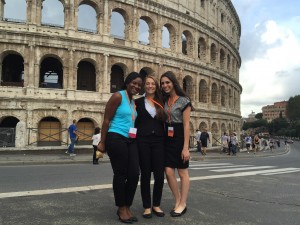PHL Scholar Report: A Glance into Global Collaboration
By Anna Kanfer, PHL Scholar and University of Illinois sophomore, majoring in agriculture and consumer economics, emphasis in public policy and law
Seven University of Illinois students were sponsored to attend the First International Congress on Postharvest Loss Prevention in Rome, Italy. They have written about their experiences for the #Prevent PHL blog campaign.

PHL Scholars Chelsea Peterson (center) and Anna Kanfer (right) with Congress presenter Mammie Hutchful, Ghana.
Upon arrival in Rome, I was starstruck. Our whole group jumped out of the cab and practically skipped all the way down our hotel’s main street to the Colosseum. It was 10 a.m. after spending 10 hours on a plane without sleep, but we felt energized. There was an hour and a half before our first appointment at the conference venue, so it was mandatory to squeeze in at least a “breakfast gelato” and a couple of pictures beforehand. We didn’t know what we’d gotten ourselves into at that point, but this wouldn’t be the last of sleepless nights and jam-packed days.
For the next four days, we were immersed in a world so far from anything I’ve seen before. The First International Congress on Postharvest Loss Prevention convened 260 people from 62 different countries to share their research, findings, and ideas on what can be done to solve this important component of world hunger. My favorite aspect of the event was getting to meet and learn about people from all different areas of the world–from right there in Rome, to as far as Ethiopia or Thailand.
At the reception on the first evening, our group met a presenter from Ghana named Mammie, whose research focused on expanding food processing capacity. We talked about her various trips all over the world, and studies during her college years in the familiar Midwestern USA! Mammie mentioned that she hadn’t had much time to do any exploring, so Chelsea and I walked with her down to the Colosseum during our lunch hour the next day. We had a great chance to learn all about the experiences and culture of her home country and shared experiences from ours.
When Mammie presented her poster the following morning, our group was able to hear a new side of her interests, and feel what it was like to gain knowledge from a colleague at a conference like this. It was interesting to learn about the types of research she engaged in, and the solutions she proposes — like spreading education so that processing plants can be developed in rural areas, eliminating the need for and danger of transportation from harvesting sites to urban plants on gravel roads. When much of the Ghanaian postharvest losses occur during transportation because of bumps and carelessness on harsh roads, this solution could drastically change outcomes for farmers and traders.
The experiences we had with Mammie were similar to those with many of the other participants, and that was my favorite part of our week in Rome. The Congress introduced us to a whole new world of collaboration, where people from all over the globe were able to come together and make a difference. In just a few short days, I learned about postharvest loss in Ghana, Zimbabwe, and Bangladesh–only to name a few of the many countries. I learned about personal experiences of people, like Mammie, from each of those places, and about how they had been shaped by their experiences. The Congress taught me more than anything else; that a global view is important when it comes to being effective in solving problems you’re passionate about. Open-mindedness and collaboration are two of the key components to success in anything. I walked away from the Congress with not only a knowledge of postharvest loss but also with a refreshed ambition to work hard in hopes of future systematic efforts, just like this one, to organize solutions to any world problems that come our way.
This post is part of the ADM Institute’s #PreventPHL blog campaign, following up on the First International Congress on Postharvest Loss Prevention. This is the first in a series of posts. For more from Congress attendees, visit this link. For more from our PHL Scholars, look for PHL Scholar Reports.
The blog entries in this #PreventPHL series are by students and members of our PHL Prevention community of practice. The opinions expressed are those of the individual authors, and do not necessarily reflect the position of the ADM Institute. In addition, none of the statements should be considered an endorsement of any person, product, or technique by the ADM Institute.



Add Comment